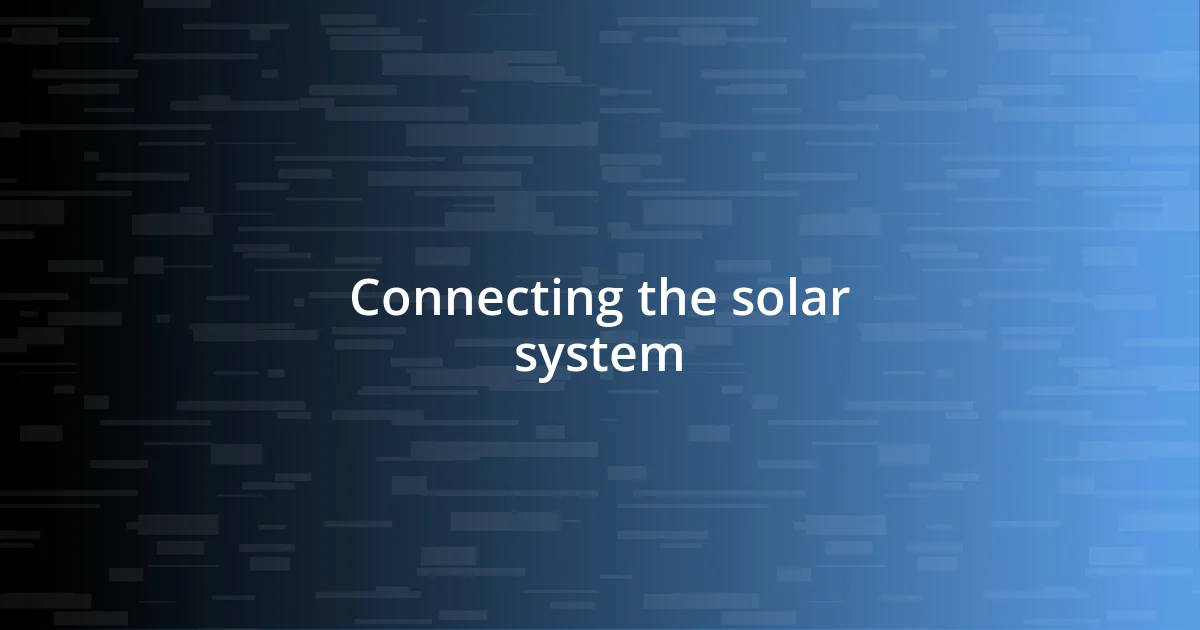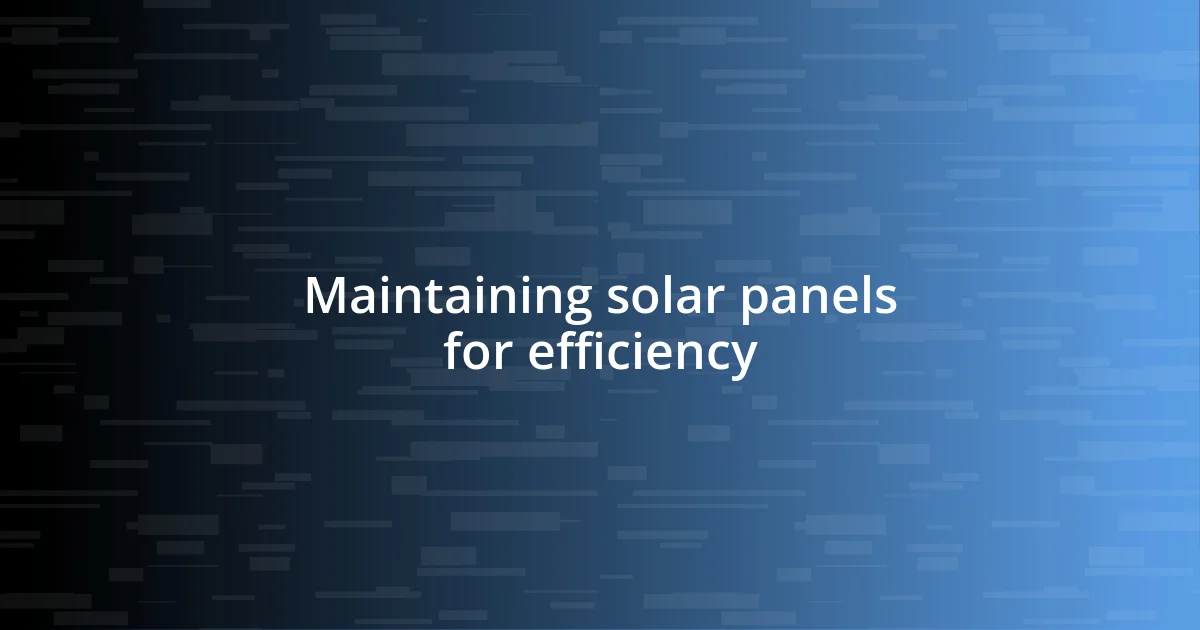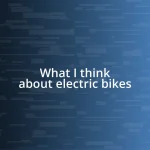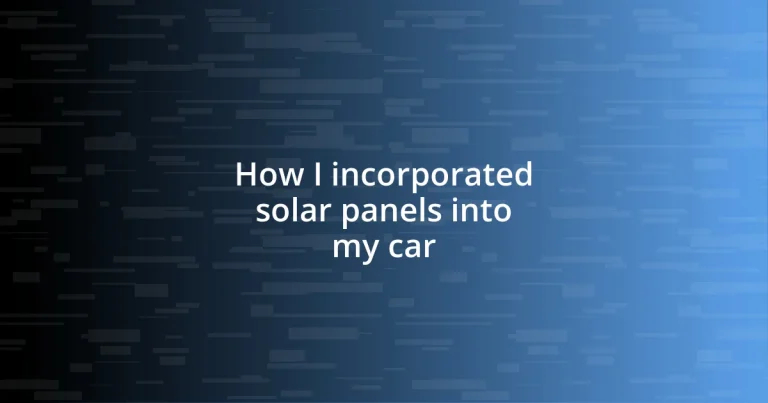Key takeaways:
- Understanding solar panels involves appreciating their simplicity and potential to reduce reliance on traditional fuels, showcasing a sustainable energy solution.
- Choosing the right solar panels is crucial; factors such as wattage, efficiency, durability, weight, and cost significantly impact performance and installation.
- Maintaining solar panels, including regular cleaning and monitoring connections, enhances efficiency, highlighting the importance of adaptability in energy use.

Understanding solar panel basics
When I first started exploring solar panels, I was amazed by their simplicity. At their core, solar panels consist of photovoltaic cells that convert sunlight into electricity. This process, which sounds complex, feels almost magical when you see it working – especially when I watched my energy meter slow down during sunny days.
I remember the moment I installed my first solar panel. The sun’s rays hit the panel, and I could genuinely see the energy flowing into my car’s battery. It got me thinking: how can we harness this abundant source of energy in our daily lives? The appeal of reducing reliance on traditional fuel excited me; I felt I was doing my part for the planet while solving my energy needs.
Many people may wonder about the efficiency of solar panels. I once had my doubts too, especially when I learned about factors like angle, sunlight exposure, and weather. However, I found that even on less-than-ideal days, the panels still generate energy, and it made me appreciate every ray of sunlight that much more. Embracing solar technology isn’t just about numbers; it’s about the feelings of empowerment and sustainability that come along with it.

Choosing the right solar panels
Choosing the right solar panels can feel overwhelming at first, but it’s a key step in making your solar journey successful. I vividly remember standing in front of a display of solar panels, feeling like a kid in a candy store. I quickly realized that while they all looked similar, their specifications varied significantly. Factors like wattage, efficiency ratings, and durability really made a difference in performance.
When evaluating which solar panels to choose, consider these essential points:
- Wattage: This indicates how much power a panel can produce. Higher wattage means more energy for your vehicle.
- Efficiency: This shows how effectively a panel converts sunlight into electricity. A higher efficiency can lead to less space required for installation.
- Durability: Check the materials used and look for warranties. Panels that can withstand harsh weather conditions are essential for longevity.
- Weight: Since you’re installing them in your car, lightweight panels will have a more manageable impact on vehicle performance.
- Cost: Don’t just look at upfront costs; consider the long-term savings on fuel and maintenance.
Once I made my decision based on these criteria, I felt a surge of confidence. Not only was I choosing the right products, but I was also investing in a sustainable future for myself and the planet.

Assessing car compatibility
Assessing compatibility is vital before integrating solar panels into your vehicle. First, I found it crucial to check whether my car’s roof was suitable for solar installation. I measured available space and looked for any obstructions like antennas or air vents that could hinder the setup. Surprisingly, I discovered that my compact car had just enough room for a couple of solar panels, providing me with the best potential energy output without compromising aesthetics.
Next, I consulted my car’s manual to understand the electrical system better. It’s not just about physical space; your vehicle needs to support the electrical specifications of the solar setup. I remember the moment I realized my car’s battery could handle the additional input. I felt a rush of excitement as I envisioned the freedom of solar energy powering my drives. Knowing what was compatible gave me peace of mind about my project!
To help clarify, here’s a comparison of various car types and their compatibility with solar panels:
| Car Type | Roof Space Availability |
|---|---|
| Compact Cars | Moderate (2-3 panels) |
| SUVs | High (4-5 panels) |
| Trucks | Very High (5+ panels) |
| Sedans | Moderate (2-3 panels) |

Connecting the solar system
Connecting the solar system meant more than just wiring panels; it was about understanding the heart of the system as a whole. I remember the moment I connected the first panel’s output wires to the charge controller. It was exhilarating to see the lights flicker on, confirming that everything was coming together as planned. I couldn’t help but wonder—could this simple connection really shift the way I use energy while driving?
Once the panels were in place, I focused on routing the wiring through the car. I took my time to ensure that everything was safely tucked away, preventing any damage during my daily drives. With each twist of the wire, I felt a mix of pride and responsibility. After all, this wasn’t just an installation; it was an adventure towards energy independence. Have you ever felt that same thrill of creating something new? For me, it was like a personal transformation.
Lastly, I had to connect the solar system to my car’s battery, which required understanding the specific requirements of my setup. I chose a solar charge controller to manage the flow of energy, ensuring my battery wouldn’t get overwhelmed. The first time I saw my battery percentage climb while parked in the sun, I felt a sense of accomplishment wash over me. It was a reminder that with every connection I made, I was embracing a sustainable lifestyle, one connection at a time.

Maintaining solar panels for efficiency
Maintaining solar panels for efficiency is a crucial aspect that I can’t stress enough. Regular cleaning is non-negotiable. I make it a habit to wipe down the panels every few weeks, removing dirt and debris that can hinder performance. During a particularly dusty summer, I noticed my energy output drop and realized that a quick clean made all the difference in efficiency. Have you ever thought about how something so simple could have such a significant impact?
Another important part of maintenance is monitoring the electrical connections. I learned this the hard way after noticing a decline in my power generation. I decided to inspect the connections and found a loose wire that had come undone. It was a small oversight but one that could have led to bigger issues down the line. Keeping an eye on solar system components has become second nature for me—like checking the oil in my car. It’s a little effort that pays off in big ways.
Lastly, consider seasonal adjustments. I’ve found that positioning the panels to capture sunlight optimally can enhance their efficiency. In winter, when the sun is lower in the sky, I adjusted them slightly for maximum exposure. I could feel the difference in energy gaining strength, which often left me thinking about how adaptability fuels efficiency—not just for solar panels, but in life as well. Isn’t it fascinating how such elements can echo the broader lessons we learn?

Exploring benefits of solar panels
Solar panels offer a remarkable way to enhance energy efficiency, not just for homes but also for vehicles. When I first installed the panels on my car, the immediate benefit was a noticeable reduction in reliance on traditional fuel sources. Imagine the thrill of experiencing guilt-free driving, knowing that the sun was powering my journeys while I cruised down the highway. Have you ever envisioned a day when energy independence is just a ride away?
The economic advantages are compelling too. Over time, I’ve witnessed a gradual decrease in fuel costs. There’s something immensely satisfying about watching my expenditures slide down while my savings climb up. I remember calculating the potential savings after a long road trip. It hit me then—investing in solar panels wasn’t merely about renewable energy; it was also a way to invest in my future. Doesn’t it feel great when your choices align with both your principles and your wallet?
Beyond just the financial and practical aspects, I find a profound emotional connection in utilizing solar power. Each time I park my car in the sun and see those little green lights flicker on, it fills me with a sense of accomplishment. It’s as if I’m not just conserving energy but participating in a larger movement towards sustainability. I often reflect on this journey—how a simple choice like solar panels can inspire a more conscious way of living. Doesn’t that spark something within you, too?














